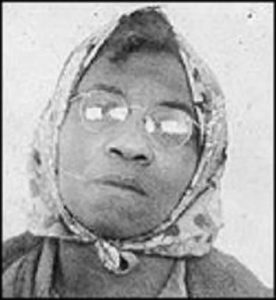
Lena Baker
*Lena Baker was born on this date in 1900. She was a Black maid.
She was born to a family of sharecroppers and raised near Cuthbert, Georgia. Her family, which included three siblings, moved to the county seat when she was a child. As a youth, she and her siblings worked as farm laborers; she chopped cotton for a farmer named J.A. Cox. By the 1940s, Baker was the mother of three children and worked as a maid to support her family. In 1944, Baker started working for Ernest Knight, an older white man who had broken his leg. He owned a gristmill and, upon sexually assaulting Lena multiple times, would imprison her there for days in "near slavery."
Knight's son and townspeople disliked their "relationship" and tried to end it by threatening Baker. One night, an argument ensued, and Knight threatened Baker with an iron bar. They struggled over his pistol as she tried to escape, and she shot and killed him. Trial and execution: Lena Baker was charged with capital murder and stood trial on August 14, 1944. The trial was presided over by Judge William "Two Gun" Worrill, who kept a pair of pistols in view on his judicial bench.
At her trial, Baker testified that Knight forced her to go with him on that Saturday evening of April 29. Baker said she escaped Knight and slept in the woods that night. As Baker returned to Cuthbert the next morning, Knight cornered her, taking her to the gristmill and locking her in. When Knight returned, Baker told him she was leaving. Baker said they "tussled over the pistol" after he threatened her with an iron bar. She immediately reported it to J.A. Cox, the county coroner who had previously employed her. The all-white, all-male jury rejected Baker's plea of self-defense and convicted her of capital murder by the end of the first day of the trial.
Governor Ellis Arnall granted Baker a 60-day reprieve so that the Board of Pardons and Parole could review the case, but in January 1945, it denied Baker clemency. She was transferred to Georgia State Prison at Reidsville on February 23, 1945. What I done, I did in self-defense, or I would have been killed myself. Where I was, I could not overcome it. God has forgiven me. I have nothing against anyone. I picked cotton for Mr. Pritchett, and he has been good to me. I am ready to go. I am one in the number. I am ready to meet my God. I have a very strong conscience. — Baker's last words.
Lena Baker was executed on March 5, 1945. She was buried in an unmarked grave behind Mount Vernon Baptist Church, where she had sung in the choir. In 1998, congregation members arranged for a simple headstone to be placed on her grave. That year, two articles were published about her case. In 2005, the Parole Board granted Baker a full and unconditional pardon. Commentators have suggested that in 1945, the Board of Pardons and Parole could have lowered her charge to voluntary manslaughter, which would have carried an average 15-year sentence and saved her life. In 2001, Lela Bond Phillips, a professor at Andrew College, published a biography titled "The Lena Baker Story," which was later adapted into a feature film of the same name in 2008.